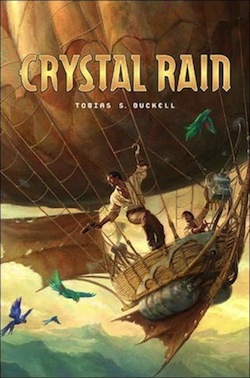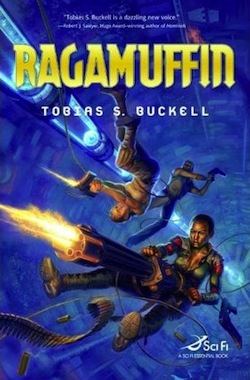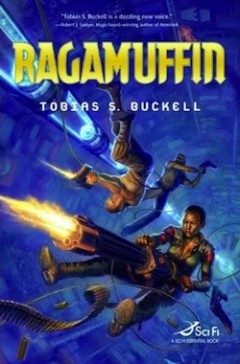
Steampunk is currently all the rage, but this book was published before steam engines and airships and whatnot became recently fashionable. And besides, Crystal Rain (Tor, 2007) is not your ordinary steampunk. It has a healthy dose of post-apocalyptic science fiction as well, but here too Crystal Rain breaks the mold. On the one hand, the setting includes sailboats and airships, gaslights, firearms, and, mostly in Capitol City, steam-powered trains, cars, and even a ship, and trolly-like electric cars. I don’t recall any conspicuous leather, aviation goggles, brass, or clockwork though. On the other hand, we quickly find out that this story takes place centuries after some cataclysmic disaster. There are near-mythical stories of the “old fathers,” and Preservationists seek to restore lost technologies. A barren area inland called Hope’s Loss causes people who travel through it to sicken and die. To add another twist, we quickly discover the story takes place not on Earth, but some distant planet, by the casual description of two moons in the sky and tales of the old fathers traveling to the land of Nanagada via “worm’s holes” and warming the planet with mirrors in the sky that have since crashed and burned. Turns out Nanagada is a lost colony planet. Caribbean-born author Tobias Buckell adds spice to the mix by populating the setting of his debut novel with a collection of mostly non-white races, dominated by Caribbean culture and dialect.
Actually, the first hints that you’re not reading the typical steampunk or post-apocalyptic novel come in the prologue when a mysterious black man with dreadlocks, dressed in top hat and trenchcoat, falls out of the sky in a “steaming metal boulder,” speaks gibberish to the natives for a minute, then after manipulating his throat suddenly speaks their language. He appears tired and thin, weak, so the natives take him back to their village — though he has strength left in him to kill a jaguar effortlessly with his bare hands on the way. After a week of pigging out, he’s all buffed out. All he tells them is that he’s looking for an old friend. This mysterious, superhuman figure we later find out to be Pepper, who features in several subsequent novels and short stories by Buckell. The author handles him well. Pepper has his limits, which are tested in the novel, and while he often appears to be a “looking out for #1,” cold-blooded mercenary-type, Buckell manages to give him a depth that defies expectations.
But the main protagonist of Crystal Rain is the man Pepper is looking for: John deBrun. John is a sailor, fisherman, and painter, with a hook in place of the left hand that he lost to frostbite on an ill-fated excursion to the icy north. He remembers nothing of his past from before he washed ashore 27 years prior in the town of Brungstun near the Wicked High Mountains that separate the Nanagadan Peninsula from the rest of the continent. But he has an uncanny ability to navigate, as if he has a GPS in his head. He has settled down there, married, and has a 13-year old son. Oh, and he doesn’t seem to have aged much in those 27 years.
Little do most know at the start, but the Azteca, who live on the other side of the Wicked Highs, are being driven by their bloodthirsty gods, the Teotl, to cross the mountains and invade Nanagada. Another main viewpoint character, Oaxyctl (O-ash-k-tul), who is actually an Aztecan double agent spying for the Nanagadans, has the bad luck to be accosted by one if his gods and tasked with tracking down John deBrun and delivering him to it or else Oaxyctl’s life will be forfeit. The Teotl needs John alive because it believes he alone possesses secret codes to unlock the Ma Wi Jung. Whatever that is. (Heh. Is John “The Chosen One”?) Oaxyctl is placed in an impossible position: mortally afraid of his gods, still fundamentally an Aztecan despite working for the Nanagadans, he later comes to like John, whom he rescues from an Aztecan war party’s sacrificial altar after John had been separated from his family and captured. Buckell keeps us wondering when, or if, Oaxyctl will betray John’s trust.

Other viewpoint characters include John’s son, Jerome, the hereditary Prime Minister (an oxymoron?) of Nanagada, Dihana, and the general of Nanagada’s military (called mongoose-men), Haidan. The latter two have hard work to do and tough decisions to make after they find about the Azteca invasion. As one might expect from a government official in wartime, Dihana enacts some rather unlibertarian policies: e.g., seizing businesses; shutting down banks; declaring emergency conditions; setting curfews; turning the Tolteca (expat Aztecan) section of Capitol City into an internment camp, which of course alienates potential allies. Aside from his expected duties as general in planning the Nanagadan defenses, Haiden discovers the whereabouts of a possible superweapon left over from the time of the old fathers. It may be their only hope, so he exerts a great deal of effort to organizing an expedition to find it and plying Dihana for support and diverted resources.
John eventually reaches Capitol City with Oaxyctl’s help, ahead of the Azteca hords. He desperately wants to get involved in the fighting to take revenge on the Azteca, but his old friend General Haiden convinces him to make another journey up north in search of the aforementioned lost weapon of the old fathers. He is to captain a new “state of the art” steamship to which tank treads can be attached so that it can traverse the ice. Prior to leaving, he meets Pepper briefly but is suspicious because he does not remember the man who claims to know him, and subsequent events lead him to vacillate between trusting and distrusting this dangerous man.
BEGIN SPOILER SECTION
It turns out some of the old fathers are still alive in and around Capitol City, being somehow very long-lived. And the Nanagadans are being manipulated by gods of their own: the Loa, frail-looking creatures compared to humans and the fearsome Teotl. We eventually discover that the Loa and Teotl are merely advanced aliens with hidden agendas. A nice touch. There are hints that they are actually competing offshoots of the same race. Both seem to have mastered the bioengineering of their own bodies and breed members of their own races for specific functions as if individual members have no freedom — division and specialization of labor taken to a collectivist extreme.
It is not just on Nanagada that humans are being manipulated by more advanced aliens. As part of the backstory of Crystal Rain, we learn that the galaxy is full of hostile aliens. At some point in the past Earth had been subjugated by another set of aliens but then eventually given political freedom.
Speaking of the faux-gods, two of Oaxyctl’s tortured internal musings really leapt out at me:
How could someone obey the gods when the gods themselves couldn’t agree with one another?
Something like this has often come immediately to mind when presented with Pascal’s Wager. It also strikes me as analogous to the situation we face on the international scene with competing nation-states and on the domestic scene with competing branches and levels of government and agencies as well as vague and often contradictory laws, particularly in light of the rampant state worship we see these days.
And then, soon after, in response to John’s declaration that he doesn’t believe in gods:
But then, without the direction of the gods, how could someone live his own life? There would be no certainty in anything. It was just as scary as facing the eagle stone [the sacrificial altar].
I was immediately reminded of how statists almost invariably respond in like manner when confronted with the possibility of a stateless society or even just the possibility of the state not providing some good or service or regulatory function. And on the state as embodying a search for ever-elusive certainty among political philosophers, and statists in general, see my (Statist) Politics as Household Management.
“How can you not believe in gods?” Oaxyctl asked. “You see them walking the ground! The gods of Capitol City are there for any to see.”
This naturally reminded me of the sophistic advantage of statists. People are used to living with an increasingly intrusive state and most buy the propaganda; they cannot imagine any other way of doing things. They easily see how they and/or certain subgroups benefit in certain ways by state policies. Benefits are concentrated and they can see state agents and the direct results of state actions. But costs are diffused and they turn a blind and ignorant eye to the unseen. Not that Buckell necessarily intended any of these analogies.
I also liked that John was not exactly a “Chosen One” figure and the Ma Wi Jung was not the superweapon those seeking it thought or hoped it to be. One does not expect tired fantasy tropes like “The Chosen One” who “quests for a magical weapon only he can wield to save the day against an otherwise unbeatable foe” in science fiction, but still it is refreshing to see them subverted.
Sure, only John could access and control the Ma Wi Jung, but not for any ineffable mystical reasons. The Ma Wi Jung is an interstellar spaceship, built by the Loa for John to pilot, and its security systems are keyed to him and him alone: he has to be alive, conscious, and uncoerced to unlock it and gain control. And special implants are required to pilot a starship. But the Loa do have another way to access and control the ship, though it will take a couple of weeks to hack in, by which time the Azteca will probably have conquered Nanagada. The ship itself lacks any weapons systems, so to use it as a weapon requires some strategic cleverness on John’s part in using its unique assets to exploit a peculiar weakness built into the Aztecans’ statist culture by the Teotl.
Despite John, Pepper, and the Ma Wi Jung, the best the Nanagadans can achieve with the Azteca at their walls is a stalemate. The most difficult decision of all is left to Dihana as she negotiates the terms of a truce with the acting Aztecan leader. It’s a terribly difficult choice, but I’m not sure how any libertarian in a similar situation would be able to decide differently. The Nanagadans managed to capture a number of high-level Aztecan priests as well as a Teotl. Both sides know the Aztecans are on the verge of capturing the city and defeating the Nanagadans outright. But the Aztecans face a dilemma. On the one hand, they need something to show for the war. On the other hand, losing the priests and one of their gods would be an unspeakable disaster. The least bad solution: the Aztecans will retreat back behind the Wicked High Mountains, but they will keep thousands of captured Nanagadans as slaves and future sacrificial victims. It’s either that or continue the fighting, which neither side could ultimately afford.
END SPOILER SECTION

Crystal Rain is an entertaining read that breaks several (sub)genre molds. It is a well-told, fast-paced action-adventure in a unique setting that does not shy away from violence, difficult decisions, and gritty realism. Crystal Rain and its sequel, Ragamuffin, leave me curious to learn more about the interesting backstory relationship between John and Pepper than they reveal; perhaps a prequel novel is in order? We do get to learn more about the Earth subjugation part of the backstory in Ragamuffin. Personally, I enjoyed Ragamuffin (review coming soon) more than Crystal Rain for a number of reasons: larger scope, prevalence of advanced technology, more prominent libertarian themes. Regarding the latter, Ragamuffin was a 2008 Prometheus Award Finalist for best libertarian novel. But I don’t recommend skipping ahead. Crystal Rain is worth reading on its own merits; plus, you’d be a bit lost and it would spoil some of the mystery in Crystal Rain for you to read them out of order.
If you’d like to sample Crystal Rain before buying, Buckell has made the first third of the novel available on his website in various formats for free.















